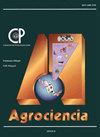SODIUM CHLORIDE AND SILICON AFFECT YIELD AND QUALITY OF TOMATO FRUITS
IF 0.5
4区 农林科学
Q4 AGRICULTURE, MULTIDISCIPLINARY
引用次数: 1
Abstract
Tomato (Solanum lycopersicum L.) is a glycophyte species with medium sensitivity to salts, tolerating electrical conductivity values in the soil solution of up to 2.5 dS m-1. Silicon (Si) is a beneficial element that can act as an inorganic biostimulant in plants subjected to salinity. In this research, the main effects of two study factors were evaluated: a) salinity by NaCl (0, 50, and 100 mM) in the nutrient solution and b) biostimulation by Si, applied to the leaves (0, 75, and 150 mg L-1), as well as the interaction of both factors on yield and quality in fruits of the second cluster of tomato plants cv. Río Supremo grown hydroponically under greenhouse conditions. Yield was significantly reduced in the saline treatments, and was not affected by the application of silicon. Compared with the control, the NaCl concentrations evaluated reduced the fruit pH value by 6.2 %, but increased titratable acidity (TA) by 64.8 %, electrical conductivity (EC) by 72.9 %, and total soluble solids (TSS) by 80 %. Consequently, the NaCl treatments increased the TSS/TA ratio, compared to the control. The application of 75 mg Si L-1 through the leaves reduced the pH of the fruit by 0.6 %, while the dose of 150 mg Si L-1 increased the EC and the TSS/TA ratio in fruits. In plants treated with 50 mM NaCl and with both doses of Si, an increase in fruit pH was recorded, while treatments with 100 mM NaCl with both doses of Si significantly reduced the TA values. The TSS/TA ratio increased with both doses of Si in the treatments with 100 mM NaCl. It is concluded that the combination of saline treatments with silicon can improve some quality attributes of tomato cv. Río Supremo fruits.氯化钠和硅影响番茄果实的产量和品质
番茄(Solanum lycopersicum L.)是一种对盐具有中等敏感性的糖叶植物,在土壤溶液中可耐受高达2.5 dS m-1的电导率值。硅(Si)是一种有益的元素,可以作为一种无机生物刺激素在植物受盐度。本研究评价了两个研究因子的主要影响:a)营养液中NaCl(0、50和100 mM)的盐度和b)叶片上Si(0、75和150 mg L-1)的生物刺激,以及这两个因子对第二丛番茄果实产量和品质的相互作用。Río supermo在温室条件下水培生长。在盐水处理下,产量显著降低,且不受施用硅的影响。与对照相比,NaCl处理使果实pH值降低6.2%,可滴定酸度(TA)提高64.8%,电导率(EC)提高72.9%,总可溶性固形物(TSS)提高80%。因此,与对照相比,NaCl处理提高了TSS/TA比率。通过叶片施用75 mg Si -1可使果实pH值降低0.6%,而150 mg Si -1可提高果实的EC和TSS/TA比值。在50 mM NaCl和两种Si处理下,果实pH值升高,而在100 mM NaCl和两种Si处理下,TA值显著降低。在100 mM NaCl处理下,TSS/TA比值随Si处理的增加而增加。综上所述,生理盐水与硅相结合处理能改善番茄的某些品质属性。Río超级水果。
本文章由计算机程序翻译,如有差异,请以英文原文为准。
求助全文
约1分钟内获得全文
求助全文
来源期刊

Agrociencia
农林科学-农业综合
CiteScore
0.50
自引率
33.30%
发文量
51
审稿时长
18-36 weeks
期刊介绍:
AGROCIENCIA is a scientific journal created and sponsored by the Colegio de Postgraduados. Its main objective is the publication and diffusion of agricultural, animal and forestry sciences research results from mexican and foreign scientists. All contributions are peer reviewed. Starting in the year 2000, AGROCIENCIA became a bimonthly and fully bilingual journal (Spanish and English versions in the same issue). Since 2007 appears every month and a half (eight issues per year). In addition to the printed issues, the full content is available in electronic format.
 求助内容:
求助内容: 应助结果提醒方式:
应助结果提醒方式:


